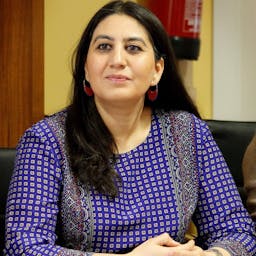Frontlines of my life
May 28, 2019
Story
I was born and raised in a small Indian town, Kanpur. Today I live in New York City, I am the founder of a women’s right organization, I am highly educated with a PhD. in Economics and a strong gender equality activist. I am grateful to my parents for not ill-treating me or aborting me when they got to know they were having a girl. Let me tell you why I really mean and value this statement: India is a land of love, vibrant cultures, languages and beautiful people. I love that part of it. It is also the land of high female foeticide, gender-based violence, and sex-select abortion. The part I hate the most. The natural sex ratio (females per 1000 male) is assumed to be 103 – 107. Any number above that is indicative of female foeticide. According to the Indian census, the sex ratio in the age group 0-6 years has steadily worsened from 927 in 2001 to 919 in 2011. That means for every 1000 boys, there are only 919 girls (2011). This abnormal sex ratio is due to a multitude of socio-economic and cultural factors including the infamous dowry system. In fact, there is a positive correlation between abnormal sex ratio and better socio-economic status and literacy. So why are we Indian obsessed with having a boy child? The reason is deep rooted in our traditions, customs, beliefs and thinking. To begin with, a girl is considered a “financial burden” from the day she is born. Money spent in raising her, feeding her, educating, marrying her has zero returns because she is considered a ‘paraya dhan’ (someone else’s property). One day she will get married and go to her husband’s house. Take his family name. So why invest in her? On the other hand, a boy will stay in the family, is every parent’s old age security, will carry forward the family’s name, will bring fame and fortune and in some cases a hefty dowry (when he gets married). “Investing in a daughter they say is like ‘watering your neighbour’s lawn.”(Justice YK Sabharwal, Chief Justice of India, 2006). Thanks to the patriarchal nature of the Indian society, a female is considered a consumer, while the male a producer. Even though the age-old practice of dowry is now an offense and legally punishable, it hasn’t deterred many parts of the country from still practicing it. As a result, when a girl is born into a family, parents spend their entire life, earning and collecting for her wedding. Often taking up huge financial burdens on themselves at the time of marriage. Parents also often worry about the safety and ‘izzat’ (honor) of their girls. Boys are considered strong and one who can take care of themselves, but girls need protection. With rising gender-based violence including rapes, parents are often stressed about their girl child’s safety. And amongst other things, according to the Hindu scriptures, it is a male who lights the funeral pyre to his dead parent(s). For these reasons and more, boys are valued more than girls and every once in a while a girl is sacrificed even before she can see life. Don’t be fooled into believing that these practices are common amongst the illiterate only. Shameful as it sounds; female foeticide is high in urban India as well. And while sex-selective abortion is legally banned in India, due to poor implementation both the doctors and patients still practice this heinous crime. So let me go back to my birth. Now you see why I feel lucky to be where I am today.
Despite the small disciplinary restrictions growing up, I am grateful that my parents never discriminated between my brother and me. I studied as much as I wanted to; in fact, I overdid it and graduated with a Ph.D. I got married 6 years after my younger brother (usually in the Indian culture, that’s not a good thing to do. Girls get married first). I left home for college when I was 18 (usually girls leave home to get married and go to their husband’s house). I did not get married till 31 years. Coming from the patriarchal society that I am a part of, I am grateful to my parents for giving us, my brother and I the wings to fly. For not aborting me or miss-treating me or giving me less than my brother. For not worrying about the ‘dowry’ they would have to pay for me. For always believing in my abilities and me and giving my brother and I equal resources, opportunities, and love to grow, learn and flourish. Today, I am a mother of a beautiful 1-year-old girl. My work as a gender equality activist is even more important now as a mother, as I strive to raise my voice for girls and women everywhere. I am proud to be connected to my culture and country and also excited to smash the patriarchy every day in each possible way.
How to Get Involved
Join us at Sayfty http://sayfty.com/about-us/volunteer/




